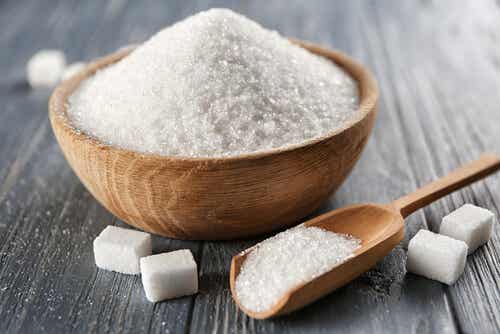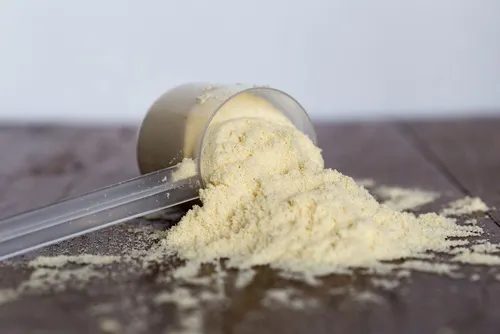Ingredients You Shouldn't Add to Coffee

Coffee is a companion like no other. We can enjoy it at work, with friends, or on a cold winter morning. However, just as you shouldn’t overdo it with the consumption of this drink, there are certain ingredients that you shouldn’t add to coffee.
Would you like to know which ones and why?
In this article, we’ll tell you.
Coffee: Is it good or bad for your health?

Believe it or not, some research indicates that this drink is very beneficial to health. However, other evidence establishes that it’s an enemy of good health. Let’s take a look.
On the one hand, some studies seem to show that coffee has benefits such as:
- It has essential nutrients like B vitamins, potassium, magnesium, and phosphorus.
- Cofee stimulates brain functions.
- It boosts metabolism.
- Cofee may help to prevent Alzheimer’s and Parkinson’s disease.
- It may help decrease the risk of diabetes 2.
- Coffee may help to protect the liver.
- It decreases the risk of depression.
On the other hand, other studies have discussed the negative side of coffee:
- It can cause anxiety.
- Cofee makes it hard to sleep.
- It can be addictive.
Overall, neither one thing nor the other. It all depends on the amount and frequency you drink it. Drinking it in moderation can bring its benefits and reduce its risks.
When is it good to drink coffee?
What scientists have agreed on is the best and worst times to drink coffee.
At breakfast, as soon as you get up, it can be bad for your health, because that’s the time we produce more cortisol, which is the hormone responsible for balancing stress and reducing blood glucose levels.
When the body receives caffeine very early in the morning, it doesn’t produce the necessary amount of this hormone. Plus, it becomes and more tolerant of the components of the drink and replaces the natural impulses that cortisol provides.
On the other hand, if we drink it at night (a very frequent habit in winter) it can cause insomnia and nightmares.
Therefore, it’s recommended to drink coffee between 10 in the morning and noon and between 2 and 5 in the afternoon if you don’t want to suffer any negative consequences.
You’ll definitely like this article: 8 Healthy Foods that are Trending in 2021
The ingredients you should never add to coffee
Two small cups of coffee a day could be a good measure for your health. However, you must also consider the effect of the other ingredients that people usually add to it.
To enjoy the benefits of coffee, you have to drink it completely alone, without any additives. The effects of coffee are seriously adulterated when we begin to mix it with other elements.
Overall, we recommend that don’t add:
Sugar

It doesn’t matter if it’s just a small teaspoon to remove the bitterness of coffee. You shouldn’t add any sugar.
Why?
Well, because you will be increasing its energy value and also adding all those “bad” components that sugar has.
The World Health Organization recommends that we should not exceed 25 grams of this sweetener per day, which is equivalent to 5% of the energy needed for 24 hours.
Don’t worry about the taste of coffee. You’ll get used to it, and soon you’ll enjoy it even without sugar!
However, if you do not get used to coffee without sugar, try brown sugar or chewing sugar instead. Or try it with a pinch of cinnamon and you’ll see how delicious it is!
Milk is something you shouldn’t add to coffee
When milk is added, coffee loses its polyphenols that act as antioxidants.
The culprits for this are the saturated fats in the milk. Studies by the Department of Chemistry at the University of Quebec, Canada, and the University of Zagreb, Croatia, show that the casein in milk blocks the antioxidant effects of coffee and tea.
Although other scientists believe that the evidence is not enough, it should also be considered that lactose raises sugar levels and causes intolerance in some people. Nutritionists say that although skimmed and semi-skimmed versions can improve the outlook, such a mixture would not be good, either.
Other alternatives to cow’s milk are vegetable milk such as soy and almond milk.
Powdered milk

We’ve already talked about liquid whole milk, but another one of the typical coffee ingredients is powdered milk because it’s easier to transport and store at the office.
However, it’s even worse than dairy in its natural state because non-dairy additives such as corn syrup and partially hydrogenated vegetable oils are used to mimic the creamy texture of milk.
This results in empty calories, artificial fats that accumulate in the arteries and under the skin and are linked to diabetes, obesity, cholesterol, and heart disease.
We think you’d like to read: The Benefits of Elevating Your Legs for 20 Minutes Per Day
Alcohol is something you shouldn’t add to coffee
To soothe a cold (or a heavy heart), some people add a splash of whiskey, cognac, or rum to their coffee. Although the body temperature does rise immediately, this does not provide any interesting nutrients.
The WHO states that alcohol intake is associated with many health problems. The most serious is cirrhosis of the liver or cancer.
Don’t add additional flavors to your coffee
The trend of the 21st century is to go to a coffee shop and have them prepare a mixture of coffee with other ingredients. Vanilla essence, cream, caramel, chocolate…hundreds of other things are added to people’s morning coffees.
While these recipes are delicious, they’re also unhealthy because not only is a lot of sugar added to the coffee, but also artificial colorings high in glucose.
All cited sources were thoroughly reviewed by our team to ensure their quality, reliability, currency, and validity. The bibliography of this article was considered reliable and of academic or scientific accuracy.
- Bioactive composition and antioxidant potential of different commonly consumed coffee brews affected by their preparation technique and milk addition.
UHC Sisters of Mercy, Children’s Hospital Zagreb, University of Zagreb, Croatia.(2012). https://www.ncbi.nlm.nih.gov/pubmed/23442632 - The effect of milk alpha-casein on the antioxidant activity of tea polyphenols.Département de Chimie-Physique, Université du Québec, Canada. (2013). https://www.ncbi.nlm.nih.gov/pubmed/24001682
- Intakes of antioxidants in coffee, wine, and vegetables are correlated with plasma carotenoids in humans.
- Lipid Clinic, Medical Department, Rikshospitalet, University of Oslo, Oslo, Norway. (2004). https://www.ncbi.nlm.nih.gov/pubmed/14988447
- Adenosine, Adenosine Receptors and the Actions of Caffeine. Bertil B. Fredholm. (1995). https://onlinelibrary.wiley.com/doi/abs/10.1111/j.1600-0773.1995.tb00111.x
- Does caffeine intake protect from Alzheimer’s disease? L. Maia A. De Mendonça. (2002). https://onlinelibrary.wiley.com/doi/full/10.1046/j.1468-1331.2002.00421.x
- Coffee, decaffeinated coffee, and tea consumption in relation to incident type 2 diabetes mellitus: a systematic review with meta-analysis. The George Institute for International Health, The University of Sydney, Australia. (2009). https://www.ncbi.nlm.nih.gov/pubmed/20008687
- Coffee, caffeine, and risk of completed suicide: results from three prospective cohorts of American adults.Department of Nutrition, Harvard School of Public Health , Boston, MA , USA. (2014). https://www.ncbi.nlm.nih.gov/pubmed/23819683
Effects of caffeine on sleep and cognition. Snel J1, Lorist MM. (2011). https://www.ncbi.nlm.nih.gov/pubmed/21531247
This text is provided for informational purposes only and does not replace consultation with a professional. If in doubt, consult your specialist.








